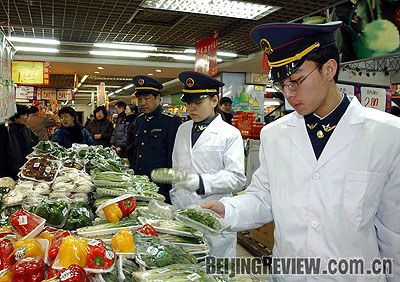|

STRICTER MONITORING: After a series of food safety scandals, authorities are stepping up inspections
Tax List Exposes Loopholes
The State Administration of Taxation recently issued the list of China's largest enterprises by tax payment in 2007. The list shows that the country's top 100 corporate taxpayers became financially stronger than they were in previous years. However, we must acknowledge that the annual lists reveal some problems in the country's economic structure.
At the top of the lists are always enterprises in monopoly industries such as petroleum, gas and tobacco, while businesses in emerging industries using high and new technologies are rarely seen.
The lists also show an unevenly developed industrial structure. For example, the manufacturing sector makes up half of both the Top 500 independent corporate taxpayer lists and the Top 500 group taxpayer lists, much higher than the service sector. Meanwhile, there also exists a geographical imbalance in China's economic development, reflected by the fact that the total number of businesses on the list that are from central and western regions is only half of that of their eastern counterparts.
What the top taxpayer list implies gives us an impression of weakness rather than strength.
Guangzhou Daily
Putting Safety First
Central China's Henan Province recently announced that if local governments fail to carry out effective food safety management, leading officials will have to take accountability or even be charged under the Criminal Law.
Measures to deal with food safety incidents have been stepped up. A number of officials connected to the contaminated milk powder scandal, which has sickened more than 13,000 children, have been removed from their posts.
Ordinary people are not supposed to investigate if milk powder is tainted by melamine. They depend on the government to ensure their basic needs, such as food safety.
Recent years have seen a series of food safety incidents, which have undoubtedly shamed many local governments that paid more attention to economic growth than people's health. That's the fundamental reason for the frequent outbreak of severe food safety incidents. It's hoped that local officials may behave more responsibly, but more importantly, the current official performance assessment mechanism needs to be updated.
It's necessary to bring officials to account after incidents have occurred, but those who die of unsafe food can't be resurrected and a damaged image of the government is hard to repair. It's vital to set up a long-term mechanism that will help ensure food safety, just as Henan has done.
China Youth Daily
Change Not Always Good
In the past 10 years, the education authorities of east China's Jiangsu Province have tried five different ways of holding the national college entrance examination, something rarely seen in the country. Teachers and parents all believe that it is not only torturing the students but also putting pressure on them.
The province's willingness to try new things to some extent shows its interest in innovation. However, the frequent change of the examination system seems like an irresponsible experimental game. The college entrance examination is an important guide for high school education. Every time the system is changed, teachers and students have to adopt a completely new teaching plan, which undoubtedly throws schools and students into a quandary and ultimately affects the learning process.
The disorder should be blamed on local education authorities' simple administrative way of thinking, ignorance of education rules and lack of respect for students. The annual college entrance examination affects the fate of all students. Any ill-devised changes to the way the examination is processed means the students will be victimized.
The education authorities are supposed to keep a relatively stable examination system after having extensively studied the process. The price is too high if a perfect examination system emerges after the future of several generations of students are ruined.
Workers' Daily
Fine-tuning Free Education
China's free compulsory education policy has ensured most school-age children get access to schools. However, this is just the first step. How to offer students high quality education is now a major challenge. In order to let their children receive good education, parents have to pay extra money to schools in places other than their hukou registration areas. According to a large-scale survey by the Beijing Normal University in Beijing's primary and middle schools, the average fee for chosen schools is 20,000 yuan ($3,000) every year, which is a large burden for ordinary families. In 2007, the average annual income of Beijing's urban households was 60,000 yuan ($8,600).
According to China's current budgetary system, the central budget pays for the compulsory education in both urban and rural areas, and local budgets are responsible for the efforts to keep local education up with that in the rest of the country. Nevertheless, as education inputs will not bring immediate profits, local governments are reluctant to increase appropriations. As a result, schools begin to charge high fees for students who choose to study there. The better a school is, the higher the fee is.
The high charge is diluting the public welfare nature of free education. This is not time for us to indulge in the greatness of free compulsory education. We should try to promote balanced development of education by increasing local budget inputs and effectively circulating teachers so that those with more experience can benefit more students.
Qilu Evening News | 